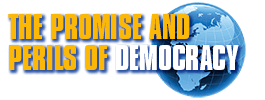The Covid-19 outbreak and the ensuing global pandemic has already had far-reaching changes for hundreds of millions of people around the world. Governments have resorted to extraordinary measures. In Italy, the whole country is on lockdown. In Germany, all “non-essential” establishments have been closed by a coordinated action of state governments and the federal government, including churches and brothels. In New York City, Mayor Bill de Blasio has repeatedly likened the fight against the virus and its consequences as to a war. And Ohio governor Mike DeWine last night announced to suspend the state primaries that were scheduled for today.
These are obviously exceptional measures that would be unthinkable under normal circumstances. German legal scholar Carl Schmitt famously wrote that “Sovereign is he who decides on the exception”, invoking the “hour of the executive”, i.e. the executive actions of the administration as the true locus of political power. But Schmitt went farther than that. In his 1922 work “Political Theology”, Schmitt writes that
“The exception is more interesting than the rule. The rule proves nothing; the exception proves everything. In the exception the power of real life breaks through the crust of a mechanism that has become torpid by repetition.”
We feel a fascination with the exception here. The individual wishes no longer to be a citizen but seeks to “break-through” – a famous topos in the pre- and inter-war intellectual continental European discourse and re-emerge in a post-crisis and post-civil world in a transformed manner.
Democracy, however, is inherently rules-based. The functioning of democratic practices relies on procedures laid down in law. The rules are transparent, and they apply to all citizens to whom they are addressed. What is more, executive action can be challenged by invoking the rules that these actions may have violated. This is the rule of law.
But democracy not only rests on rules and procedures as a guidebook for executive, judicial and legislative action by which these powers are bound and to which they are accountable. As a consequence of these functions, the rules and procedures also serve as the basis of legitimacy in a democracy. This functional duality that at the same time binds action in the political realm and legitimizes it, has been invoked by Jürgen Habermas in the thought of constitutional patriotism as the emotional and intellectual attachment to a democratic state and its order. It presupposes a political arena in which political discourse among citizens is possible. In this communicative process, norms and rules are established, contested, and legitimized. The abstract name of this process is democracy.
We’d be well advised to spend some time thinking about the relationship between norms and rules on the one hand and their abandonment on the other in a situation of exceptional circumstances – a state of exception in Schmitt’s sense, be it declared or undeclared. Even in the darkest moments of the current public health crisis (which is bound to become graver by the day), we should not forget the perils that a state of emergency holds for democracy. If the people allow the government to suspend the law in the name of a supposed “greater good”, the current crisis will do damage far beyond public health and the economy.
